Canon SX700 vs Sony HX80
The Canon PowerShot SX700 HS and the Sony Cyber-shot DSC-HX80 are two digital cameras that were announced, respectively, in February 2014 and March 2016. Both the SX700 and the HX80 are fixed lens compact cameras that are equipped with a 1/2.3-inch sensor. The Canon has a resolution of 15.9 megapixels, whereas the Sony provides 18 MP.
Below is an overview of the main specs of the two cameras as a starting point for the comparison.

Check SX700 offers at
ebay.com

Check HX80 offers at
ebay.com
Going beyond this snapshot of core features and characteristics, what are the differences between the Canon PowerShot SX700 HS and the Sony Cyber-shot DSC-HX80? Which one should you buy? Read on to find out how these two cameras compare with respect to their body size, their imaging sensors, their shooting features, their input-output connections, and their reception by expert reviewers.
Body comparison
An illustration of the physical size and weight of the Canon SX700 and the Sony HX80 is provided in the side-by-side display below. The two cameras are presented according to their relative size. Three consecutive perspectives from the front, the top, and the back are available. All size dimensions are rounded to the nearest millimeter.
The SX700 can be obtained in two different colors (black, red), while the HX80 is only available in black.
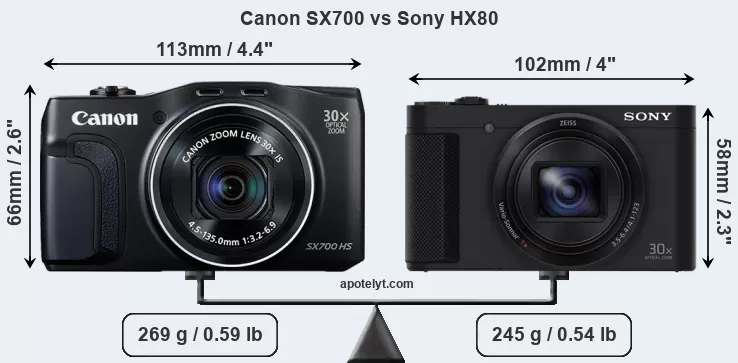
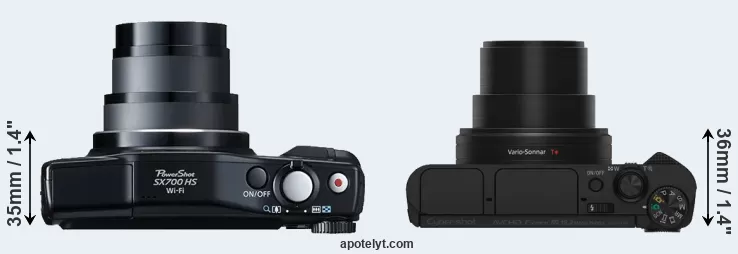
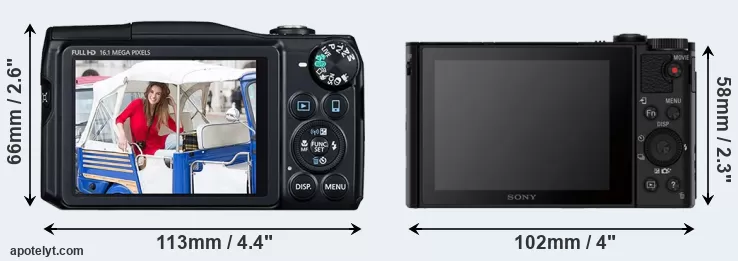
If the front view area (width x height) of the cameras is taken as an aggregate measure of their size, the Sony HX80 is notably smaller (21 percent) than the Canon SX700. Moreover, the HX80 is markedly lighter (9 percent) than the SX700. In this context, it is worth noting that neither the SX700 nor the HX80 are weather-sealed.
Concerning battery life, the SX700 gets 250 shots out of its Canon NB-6LH battery, while the HX80 can take 390 images on a single charge of its Sony NP-BX1 power pack. The power pack in the HX80 can be charged via the USB port, which can be very convenient when travelling.
The following table provides a synthesis of the main physical specifications of the two cameras and other similar ones. If you want to switch the focus of the display and review another camera pair, you can move across to the CAM-parator tool and choose from the broad selection of possible camera comparisons there.

| Camera Model |
Camera Width |
Camera Height |
Camera Depth |
Camera Weight |
Battery Life |
Weather Sealing |
Camera Launch |
Launch Price (USD) |
Street Price |
||
|---|---|---|---|---|---|---|---|---|---|---|---|
| 1. | Canon SX700 | 113 mm | 66 mm | 35 mm | 269 g | 250 | n | Feb 2014 | 349 | ebay.com | |
| 2. | Sony HX80 | 102 mm | 58 mm | 36 mm | 245 g | 390 | n | Mar 2016 | 349 | ebay.com | |
| 3. | Canon SX400 | 104 mm | 69 mm | 80 mm | 313 g | 190 | n | Jul 2014 | 249 | ebay.com | |
| 4. | Canon SX410 | 104 mm | 69 mm | 85 mm | 325 g | 185 | n | Feb 2015 | 279 | ebay.com | |
| 5. | Canon SX420 | 104 mm | 69 mm | 85 mm | 325 g | 195 | n | Jan 2016 | 299 | ebay.com | |
| 6. | Canon SX520 | 120 mm | 82 mm | 92 mm | 441 g | 210 | n | Jul 2014 | 399 | ebay.com | |
| 7. | Canon SX530 | 120 mm | 82 mm | 92 mm | 442 g | 210 | n | Jan 2015 | 429 | ebay.com | |
| 8. | Canon SX710 | 113 mm | 66 mm | 35 mm | 269 g | 230 | n | Jan 2015 | 349 | ebay.com | |
| 9. | Canon SX720 | 110 mm | 64 mm | 36 mm | 270 g | 250 | n | Feb 2016 | 379 | ebay.com | |
| 10. | Canon SX730 | 110 mm | 64 mm | 40 mm | 300 g | 250 | n | Apr 2017 | 399 | ebay.com | |
| 11. | Canon SX740 | 110 mm | 64 mm | 40 mm | 299 g | 265 | n | Jul 2018 | 399 | amazon.com | |
| 12. | Sony HX90V | 102 mm | 58 mm | 36 mm | 245 g | 360 | n | Apr 2015 | 429 | ebay.com | |
| 13. | Sony RX100 V | 102 mm | 58 mm | 41 mm | 299 g | 220 | n | Oct 2016 | 999 | ebay.com | |
| 14. | Sony WX800 | 102 mm | 58 mm | 36 mm | 233 g | 370 | n | Oct 2018 | 399 | ebay.com | |
| Note: Measurements and pricing do not include easily detachable parts, such as add-on or interchangeable lenses or optional viewfinders. | |||||||||||
Any camera decision will naturally be influenced heavily by the price. The manufacturer’s suggested retail prices give an idea on the placement of the camera in the maker’s lineup and the broader market. The two cameras under review were launched at the same price and fall into the same market segment. Usually, retail prices stay at first close to the launch price, but after several months, discounts become available. Later in the product cycle and, in particular, when the replacement model is about to appear, further discounting and stock clearance sales often push the camera price considerably down. Then, after the new model is out, very good deals can frequently be found on the pre-owned market.
Sensor comparison
The size of the imaging sensor is a crucial determinant of image quality. A large sensor will generally have larger individual pixels that offer better low-light sensitivity, provide wider dynamic range, and have richer color-depth than smaller pixels in a sensor of the same technological generation. Further, a large sensor camera will give the photographer additional creative options when using shallow depth-of-field to isolate a subject from its background. On the downside, larger sensors are more costly to manufacture and tend to lead to bigger and heavier cameras and lenses.
Both cameras under consideration feature a 1/2.3-inch sensor and have a format factor (sometimes also referred to as "crop factor") of 5.6. Within the spectrum of camera sensors, this places the review cameras among the smaller-sensor digicams that favor affordability and compact design. Both cameras feature a native aspect ratio (sensor width to sensor height) of 4:3.
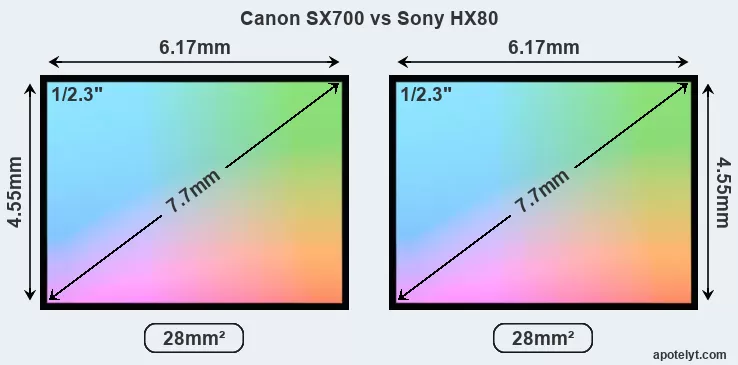
While the two cameras under review share the same sensor size, the HX80 offers a higher resolution of 18 megapixels, compared with 15.9 MP of the SX700. This megapixels advantage translates into a 6 percent gain in linear resolution. On the other hand, these sensor specs imply that the HX80 has a higher pixel density and a smaller size of the individual pixel (with a pixel pitch of 1.25μm versus 1.33μm for the SX700). However, it should be noted that the HX80 is much more recent (by 2 years) than the SX700, and its sensor will have benefitted from technological advances during this time that compensate for the smaller pixel size. Coming back to sensor resolution, it should be mentioned that neither of the two cameras has an anti-alias filter installed, so they are able to capture all the detail the sensor resolves.
The resolution advantage of the Sony HX80 implies greater flexibility for cropping images or the possibility to print larger pictures. The maximum print size of the HX80 for good quality output (200 dots per inch) amounts to 24.5 x 18.4 inches or 62.2 x 46.6 cm, for very good quality (250 dpi) 19.6 x 14.7 inches or 49.7 x 37.3 cm, and for excellent quality (300 dpi) 16.3 x 12.2 inches or 41.5 x 31.1 cm. The corresponding values for the Canon SX700 are 23 x 17.3 inches or 58.5 x 43.9 cm for good quality, 18.4 x 13.8 inches or 46.8 x 35.1 cm for very good quality, and 15.4 x 11.5 inches or 39 x 29.3 cm for excellent quality prints.
The Canon PowerShot SX700 HS has a native sensitivity range from ISO 100 to ISO 3200. The corresponding ISO settings for the Sony Cyber-shot DSC-HX80 are ISO 80 to ISO 3200, with the possibility to increase the ISO range to 80-12800.
Technology-wise, both cameras are equipped with BSI-CMOS (Backside Illuminated Complementary Metal–Oxide–Semiconductor) sensors. Both cameras use a Bayer filter for capturing RGB colors on a square grid of photosensors. This arrangement is found in most digital cameras.
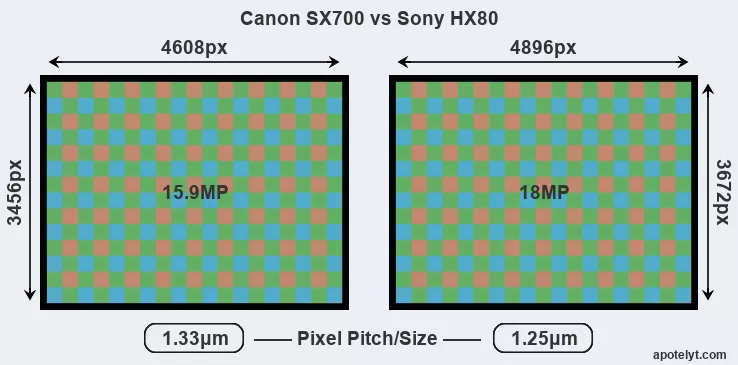
Consistent information on actual sensor performance is available from DXO Mark for many cameras. This service is based on lab testing and assigns an overall score to each camera sensor, as well as ratings for dynamic range ("DXO Landscape"), color depth ("DXO Portrait"), and low-light sensitivity ("DXO Sports"). The following table provides an overview of the physical sensor characteristics, as well as the sensor quality measurements for a selection of comparators.

| Camera Model |
Sensor Class |
Resolution (MP) |
Horiz. Pixels |
Vert. Pixels |
Video Format |
DXO Portrait |
DXO Landscape |
DXO Sports |
DXO Overall |
||
|---|---|---|---|---|---|---|---|---|---|---|---|
| 1. | Canon SX700 | 1/2.3 | 15.9 | 4608 | 3456 | 1080/60p | 20.1 | 11.4 | 629 | 45 | |
| 2. | Sony HX80 | 1/2.3 | 18.0 | 4896 | 3672 | 1080/60p | 20.4 | 11.8 | 822 | 48 | |
| 3. | Canon SX400 | 1/2.3 | 15.9 | 4608 | 3456 | 720/30p | 20.1 | 11.5 | 672 | 46 | |
| 4. | Canon SX410 | 1/2.3 | 19.9 | 5152 | 3864 | 720/30p | 20.2 | 11.6 | 720 | 47 | |
| 5. | Canon SX420 | 1/2.3 | 19.9 | 5152 | 3864 | 720/25p | 20.3 | 11.7 | 806 | 48 | |
| 6. | Canon SX520 | 1/2.3 | 15.9 | 4608 | 3456 | 1080/30p | 20.1 | 11.5 | 672 | 46 | |
| 7. | Canon SX530 | 1/2.3 | 15.9 | 4608 | 3456 | 1080/30p | 20.2 | 11.6 | 712 | 47 | |
| 8. | Canon SX710 | 1/2.3 | 20.2 | 5184 | 3888 | 1080/60p | 20.2 | 11.6 | 712 | 47 | |
| 9. | Canon SX720 | 1/2.3 | 20.2 | 5184 | 3888 | 1080/60p | 20.3 | 11.8 | 817 | 48 | |
| 10. | Canon SX730 | 1/2.3 | 20.2 | 5184 | 3888 | 1080/60p | 20.5 | 11.9 | 924 | 50 | |
| 11. | Canon SX740 | 1/2.3 | 20.2 | 5184 | 3888 | 4K/30p | 20.6 | 12.1 | 1050 | 51 | |
| 12. | Sony HX90V | 1/2.3 | 18.0 | 4896 | 3672 | 1080/60p | 20.2 | 11.6 | 738 | 47 | |
| 13. | Sony RX100 V | 1-inch | 20.0 | 5472 | 3648 | 4K/30p | 22.8 | 12.4 | 586 | 70 | |
| 14. | Sony WX800 | 1/2.3 | 18.0 | 4896 | 3672 | 4K/30p | 20.6 | 12.2 | 1070 | 51 | |
| Note: DXO values in italics represent estimates based on sensor size and age. | |||||||||||
Many modern cameras are not only capable of taking still images, but can also record movies. Both cameras under consideration are equipped with sensors that have a sufficiently high read-out speed for moving images, and both provide the same movie specifications (1080/60p).
Feature comparison
Beyond body and sensor, cameras can and do differ across a range of features. For example, the HX80 has an electronic viewfinder (638k dots), which can be very helpful when shooting in bright sunlight. In contrast, the SX700 relies on live view and the rear LCD for framing. The table below summarizes some of the other core capabilities of the Canon SX700 and Sony HX80 in connection with corresponding information for a sample of similar cameras.

| Camera Model |
Viewfinder (Type or 000 dots) |
Control Panel (yes/no) |
LCD Specifications (inch/000 dots) |
LCD Attach- ment |
Touch Screen (yes/no) |
Max Shutter Speed * |
Max Shutter Flaps * |
Built-in Flash (yes/no) |
Built-in Image Stab |
||
|---|---|---|---|---|---|---|---|---|---|---|---|
| 1. | Canon SX700 | none | n | 3.0 / 922 | fixed | n | 1/3200s | 8.5/s | Y | Y | |
| 2. | Sony HX80 | 638 | n | 3.0 / 922 | tilting | n | 1/2000s | 10.0/s | Y | Y | |
| 3. | Canon SX400 | none | n | 3.0 / 230 | fixed | n | 1/1600s | 0.8/s | Y | Y | |
| 4. | Canon SX410 | none | n | 3.0 / 230 | fixed | n | 1/4000s | 0.5/s | Y | Y | |
| 5. | Canon SX420 | none | n | 3.0 / 230 | fixed | n | 1/4000s | 0.5/s | Y | Y | |
| 6. | Canon SX520 | none | n | 3.0 / 461 | fixed | n | 1/2000s | 1.6/s | Y | Y | |
| 7. | Canon SX530 | none | n | 3.0 / 461 | fixed | n | 1/2000s | 1.6/s | Y | Y | |
| 8. | Canon SX710 | none | n | 3.0 / 922 | fixed | n | 1/3200s | 6.0/s | Y | Y | |
| 9. | Canon SX720 | none | n | 3.0 / 922 | fixed | n | 1/3200s | 5.9/s | Y | Y | |
| 10. | Canon SX730 | none | n | 3.0 / 922 | tilting | n | 1/3200s | 5.9/s | Y | Y | |
| 11. | Canon SX740 | none | n | 3.0 / 922 | tilting | n | 1/3200s | 10.0/s | Y | Y | |
| 12. | Sony HX90V | 638 | n | 3.0 / 921 | tilting | n | 1/2000s | 10.0/s | Y | Y | |
| 13. | Sony RX100 V | 2359 | n | 3.0 / 1229 | tilting | n | 1/2000s | 24.0/s | Y | Y | |
| 14. | Sony WX800 | none | n | 3.0 / 922 | tilting | Y | 1/2000s | 10.0/s | Y | Y | |
| Note: *) Information refers to the mechanical shutter, unless the camera only has an electronic one. | |||||||||||
Both the SX700 and the HX80 have zoom lenses built in. The SX700 has a 25-750mm f/3.2-6.9 optic and the HX80 offers a 24-720mm f/3.5-6.4 (focal lengths in full frame equivalent terms). Hence, the Sony provides a wider angle of view at the short end than the Canon, but less tele-photo reach at the long end. The SX700 offers the faster maximum aperture.
The SX700 writes its imaging data to SDXC cards, while the HX80 uses SDXC or Memory Stick PRO Duo cards. The HX80 supports UHS-I cards (Ultra High Speed data transfer of up to 104 MB/s), while the SX700 cannot take advantage of Ultra High Speed SD cards.
Connectivity comparison
For some imaging applications, the extent to which a camera can communicate with its environment can be an important aspect in the camera decision process. The table below provides an overview of the connectivity of the Canon PowerShot SX700 HS and Sony Cyber-shot DSC-HX80 and, in particular, the interfaces the cameras (and selected comparators) provide for accessory control and data transfer.

| Camera Model |
Hotshoe Port |
Internal Mic / Speaker |
Microphone Port |
Headphone Port |
HDMI Port |
USB Port |
WiFi Support |
NFC Support |
Bluetooth Support |
||
|---|---|---|---|---|---|---|---|---|---|---|---|
| 1. | Canon SX700 | - | stereo / mono | - | - | micro | 2.0 | Y | Y | - | |
| 2. | Sony HX80 | - | stereo / mono | - | - | micro | 2.0 | Y | Y | - | |
| 3. | Canon SX400 | - | stereo / mono | - | - | - | 2.0 | - | - | - | |
| 4. | Canon SX410 | - | stereo / mono | - | - | - | 2.0 | - | - | - | |
| 5. | Canon SX420 | - | mono / mono | - | - | - | 2.0 | Y | Y | - | |
| 6. | Canon SX520 | - | stereo / mono | - | - | mini | 2.0 | - | - | - | |
| 7. | Canon SX530 | - | stereo / mono | - | - | mini | 2.0 | Y | Y | - | |
| 8. | Canon SX710 | - | stereo / mono | - | - | micro | 2.0 | Y | Y | - | |
| 9. | Canon SX720 | - | stereo / mono | - | - | micro | 2.0 | Y | Y | - | |
| 10. | Canon SX730 | - | stereo / mono | - | - | micro | 2.0 | Y | Y | Y | |
| 11. | Canon SX740 | - | stereo / mono | - | - | micro | 2.0 | Y | - | Y | |
| 12. | Sony HX90V | - | stereo / mono | - | - | micro | 2.0 | Y | Y | - | |
| 13. | Sony RX100 V | - | stereo / mono | - | - | micro | 2.0 | Y | Y | - | |
| 14. | Sony WX800 | - | stereo / mono | - | - | micro | 2.0 | Y | Y | - |
Both the SX700 and the HX80 have been discontinued, but can regularly be found used on ebay. The SX700 was replaced by the Canon SX710, while the HX80 was followed by the Sony HX90. Further information on the features and operation of the SX700 and HX80 can be found, respectively, in the Canon SX700 Manual (free pdf) or the online Sony HX80 Manual.
Review summary
So what conclusions can be drawn? Which of the two cameras – the Canon SX700 or the Sony HX80 – has the upper hand? Is one clearly better than the other? The listing below highlights the relative strengths of the two models.

Reasons to prefer the Canon PowerShot SX700 HS:
- Faster shutter: Has higher mechanical shutter speed (1/3200s vs 1/2000s) to freeze action.
- Better light gathering: Has a lens with a wider maximum aperture (f/3.2 vs f/3.5).
- More tele-reach: Has a longer tele-lens for perspective compression and subject magnification.
- More heavily discounted: Has been available for much longer (launched in February 2014).

Arguments in favor of the Sony Cyber-shot DSC-HX80:
- More detail: Has more megapixels (18 vs 15.9MP), which boosts linear resolution by 6%.
- Easier framing: Has an electronic viewfinder for image composition and settings control.
- More flexible LCD: Has a tilting screen for odd-angle shots in landscape orientation.
- More selfie-friendly: Has an articulated screen that can be turned to be front-facing.
- Faster burst: Shoots at higher frequency (10 vs 8.5 flaps/sec) to capture the decisive moment.
- Wider view: Has a wider-angle lens that facilitates landscape or interior shots.
- More compact: Is smaller (102x58mm vs 113x66mm) and will fit more readily into a bag.
- Longer lasting: Gets more shots (390 versus 250) out of a single battery charge.
- Easier travel charging: Can be conveniently charged via its USB port.
- Faster buffer clearing: Has an SD card interface that supports the UHS-I standard.
- More modern: Reflects 2 years of technical progress since the SX700 launch.
If the count of individual advantages (bullet points above) is taken as a guide, the HX80 is the clear winner of the contest (11 : 4 points). However, the relative importance of the various individual camera aspects will vary according to personal preferences and needs, so that you might like to apply corresponding weights to the particular features before making a decision on a new camera. A professional wildlife photographer will view the differences between cameras in a way that diverges from the perspective of a family photog, and a person interested in architecture has distinct needs from a sports shooter. Hence, the decision which camera is best and worth buying is often a very personal one.
How about other alternatives? Do the specifications of the Canon SX700 and the Sony HX80 place the cameras among the top in their class? Find out in the latest Best Superzoom Camera listing whether the two cameras rank among the cream of the crop.
In any case, while the comparison of the spec-sheets of cameras can offer a general idea of their imaging potential, it says little about, for example, the shooting experience and imaging performance of the SX700 and the HX80 in practical situations. User reviews that are available, for instance, at amazon can sometimes shed light on these issues, but such feedback is all too often partial, inconsistent, and inaccurate.
Expert reviews
This is where reviews by experts come in. The following table reports the overall ratings of the cameras as published by some of the major camera review sites (amateurphotographer [AP], cameralabs [CL], digitalcameraworld [DCW], dpreview [DPR], ephotozine [EPZ], photographyblog [PB]). As can be seen, the professional reviewers agree in many cases on the quality of different cameras, but sometimes their assessments diverge, reinforcing the earlier point that a camera decision is often a very personal choice.

| Camera Model |
AP score |
CL score |
DCW score |
DPR score |
EPZ score |
PB score |
Camera Launch |
Launch Price (USD) |
Street Price |
||
|---|---|---|---|---|---|---|---|---|---|---|---|
| 1. | Canon SX700 | .. | + + | .. | .. | 4/5 | 4/5 | Feb 2014 | 349 | ebay.com | |
| 2. | Sony HX80 | .. | .. | .. | .. | .. | .. | Mar 2016 | 349 | ebay.com | |
| 3. | Canon SX400 | .. | + | .. | .. | .. | .. | Jul 2014 | 249 | ebay.com | |
| 4. | Canon SX410 | .. | o | .. | .. | .. | .. | Feb 2015 | 279 | ebay.com | |
| 5. | Canon SX420 | .. | .. | .. | .. | .. | 3/5 | Jan 2016 | 299 | ebay.com | |
| 6. | Canon SX520 | .. | + | .. | .. | 3.5/5 | 3.5/5 | Jul 2014 | 399 | ebay.com | |
| 7. | Canon SX530 | .. | + + | .. | .. | 4/5 | 4/5 | Jan 2015 | 429 | ebay.com | |
| 8. | Canon SX710 | .. | + | .. | .. | 4/5 | 3.5/5 | Jan 2015 | 349 | ebay.com | |
| 9. | Canon SX720 | .. | + | .. | .. | 4/5 | 4.5/5 | Feb 2016 | 379 | ebay.com | |
| 10. | Canon SX730 | .. | + | .. | .. | 4/5 | 4/5 | Apr 2017 | 399 | ebay.com | |
| 11. | Canon SX740 | .. | + | 3.5/5 | .. | 4/5 | 4/5 | Jul 2018 | 399 | amazon.com | |
| 12. | Sony HX90V | 4/5 | + + | .. | .. | 4/5 | 4.5/5 | Apr 2015 | 429 | ebay.com | |
| 13. | Sony RX100 V | 4.5/5 | + + | .. | 83/100 | 4/5 | 4.5/5 | Oct 2016 | 999 | ebay.com | |
| 14. | Sony WX800 | .. | .. | .. | .. | .. | .. | Oct 2018 | 399 | ebay.com | |
| Note: (+ +) highly recommended; (+) recommended; (o) reviewed; (..) not available. | |||||||||||
Care should be taken when interpreting the review scores above, though. The ratings were established in reference to similarly priced cameras that were available in the market at the time of the review. A score, therefore, has to be seen in close connection to the price and market introduction time of the camera, and comparing ratings of very distinct cameras or ones that are far apart in terms of their release date have little meaning. Also, please note that some of the review sites have changed their methodology and reporting over time.

Check SX700 offers at
ebay.com

Check HX80 offers at
ebay.com
Other camera comparisons
Did this review help to inform your camera decision process? If you would like to see a different side-by-side camera review, just make a corresponding selection in the search boxes below. As an alternative, you can also directly jump to any one of the listed comparisons that were previously generated by the CAM-parator tool.
- Canon 200D vs Canon SX700
- Canon 350D vs Sony HX80
- Canon 760D vs Sony HX80
- Canon M50 vs Canon SX700
- Canon M6 Mark II vs Canon SX700
- Canon R10 vs Canon SX700
- Canon SX700 vs Canon SX730
- Canon SX700 vs Fujifilm XP130
- Fujifilm X-A10 vs Sony HX80
- Nikon D1X vs Sony HX80
- Nikon Z8 vs Sony HX80
- Olympus E-420 vs Sony HX80
Specifications: Canon SX700 vs Sony HX80
Below is a side-by-side comparison of the specs of the two cameras to facilitate a quick review of their differences and common features.
| Camera Model | Canon SX700 | Sony HX80 |
|---|---|---|
| Camera Type | Fixed lens compact camera | Fixed lens compact camera |
| Camera Lens | 25-750mm f/3.2-6.9 | 24-720mm f/3.5-6.4 |
| Launch Date | February 2014 | March 2016 |
| Launch Price | USD 349 | USD 349 |
| Sensor Specs | Canon SX700 | Sony HX80 |
| Sensor Technology | BSI-CMOS | BSI-CMOS |
| Sensor Format | 1/2.3" Sensor | 1/2.3" Sensor |
| Sensor Size | 6.17 x 4.55 mm | 6.17 x 4.55 mm |
| Sensor Area | 28.0735 mm2 | 28.0735 mm2 |
| Sensor Diagonal | 7.7 mm | 7.7 mm |
| Crop Factor | 5.6x | 5.6x |
| Sensor Resolution | 15.9 Megapixels | 18 Megapixels |
| Image Resolution | 4608 x 3456 pixels | 4896 x 3672 pixels |
| Pixel Pitch | 1.33 μm | 1.25 μm |
| Pixel Density | 56.73 MP/cm2 | 64.04 MP/cm2 |
| Moiré control | no AA filter | no AA filter |
| Movie Capability | 1080/60p Video | 1080/60p Video |
| ISO Setting | 100 - 3,200 ISO | 80 - 3,200 ISO |
| ISO Boost | no Enhancement | 80 - 12,800 ISO |
| Image Processor | DIGIC 6 | BIONZ X |
| Screen Specs | Canon SX700 | Sony HX80 |
| Viewfinder Type | no viewfinder | Electronic viewfinder |
| Viewfinder Field of View | 100% | |
| Viewfinder Resolution | 638k dots | |
| LCD Framing | Live View | Live View |
| Rear LCD Size | 3.0inch | 3.0inch |
| LCD Resolution | 922k dots | 922k dots |
| LCD Attachment | Fixed screen | Tilting screen |
| Shooting Specs | Canon SX700 | Sony HX80 |
| Focus System | Contrast-detect AF | Contrast-detect AF |
| Continuous Shooting | 8.5 shutter flaps/s | 10 shutter flaps/s |
| Fill Flash | Built-in Flash | Built-in Flash |
| Storage Medium | SDXC cards | MS or SDXC cards |
| Single or Dual Card Slots | Single card slot | Single card slot |
| UHS card support | no | UHS-I |
| Connectivity Specs | Canon SX700 | Sony HX80 |
| External Flash | no Hotshoe | no Hotshoe |
| USB Connector | USB 2.0 | USB 2.0 |
| HDMI Port | micro HDMI | micro HDMI |
| Wifi Support | Wifi built-in | Wifi built-in |
| Near-Field Communication | NFC built-in | NFC built-in |
| Body Specs | Canon SX700 | Sony HX80 |
| Battery Type | Canon NB-6LH | Sony NP-BX1 |
| Battery Life (CIPA) | 250 shots per charge | 390 shots per charge |
| In-Camera Charging | no USB charging | USB charging |
| Body Dimensions |
113 x 66 x 35 mm (4.4 x 2.6 x 1.4 in) |
102 x 58 x 36 mm (4.0 x 2.3 x 1.4 in) |
| Camera Weight | 269 g (9.5 oz) | 245 g (8.6 oz) |

Check SX700 offers at
ebay.com

Check HX80 offers at
ebay.com
Did you notice an error on this page? If so, please get in touch, so that we can correct the information.

